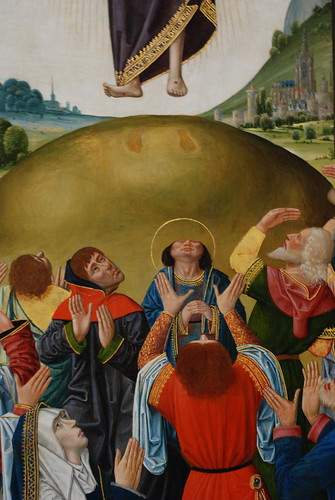From St. Thomas Aquinas, Summa theologiae II-II.2.2c:
The act of any power or habit depends on the relation of that power or habit to its object. Now the object of faith can be considered in three ways. For, since "to believe" is an act of the intellect, in so far as the will moves it to assent, as stated above (1, ad 3), the object of faith can be considered either on the part of the intellect, or on the part of the will that moves the intellect.
If it be considered (A) on the part of the intellect, then two things can be observed in the object of faith, as stated above (ST II-II.1.1).
One of these (1) is the material object of faith, and in this way an act of faith is "to believe in a God" (credere Deum); because, as stated above (ST II-II.1.1) nothing is proposed to our belief, except in as much as it is referred to God.
The other (2) is the formal aspect of the object, for it is the medium on account of which we assent to such and such a point of faith; and thus an act of faith is "to believe God" (credere Deo), since, as stated above (ST II-II.1.1) the formal object of faith is the First Truth, to Which man gives his adhesion, so as to assent to Its sake to whatever he believes.
Thirdly, if the object of faith be considered (B) insofar as the intellect is moved by the will, an act of faith is "to believe in God" (credere in Deum). For the First Truth is referred to the will, through having the aspect of an end.
Respondeo dicendum quod actus cuiuslibet potentiae vel habitus accipitur secundum ordinem potentiae vel habitus ad suum obiectum. Obiectum autem fidei potest tripliciter considerari. Cum enim credere ad intellectum pertineat prout est a voluntate motus ad assentiendum, ut dictum est, potest obiectum fidei accipi vel ex parte ipsius intellectus, vel ex parte voluntatis intellectum moventis. Si quidem ex parte intellectus, sic in obiecto fidei duo possunt considerari, sicut supra dictum est. Quorum unum est materiale obiectum fidei. Et sic ponitur actus fidei credere Deum, quia, sicut supra dictum est, nihil proponitur nobis ad credendum nisi secundum quod ad Deum pertinet. Aliud autem est formalis ratio obiecti, quod est sicut medium propter quod tali credibili assentitur. Et sic ponitur actus fidei credere Deo, quia, sicut supra dictum est, formale obiectum fidei est veritas prima, cui inhaeret homo ut propter eam creditis assentiat. Si vero consideretur tertio modo obiectum fidei, secundum quod intellectus est motus a voluntate, sic ponitur actus fidei credere in Deum, veritas enim prima ad voluntatem refertur secundum quod habet rationem finis.
Cf. Garrigou-Lagrange, OP - The Theological Virtues: Volume I: On Faith ; A Commentary on St. Thomas' Theolocical Summa (link to Amazon.com).







.jpg)





No comments:
Post a Comment